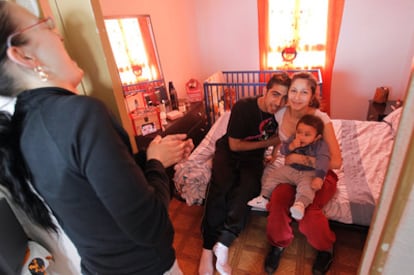Who's that living in my house?
Organized gangs are occupying empty properties on a Madrid development, leaving residents afraid to leave their homes for any period of time
An empty house can be an attractive prospect for a family without a home. On the San Jorge housing development in Puente de Vallecas, Madrid, it's something they know well. For months residents have been living in fear that their houses will be filled up by squatters. They locate empty apartments, they enter them and live in them- and then the odyssey of obtaining a court order to get them thrown out starts for the owners. And even if the judicial police evict them, that still might not be the end. Homeowners have received "warnings" from the people who occupied their properties, saying that even if they change the locks, they could come back again the next day.
It's something, for example, that happened to Gustavo Tardón. His mother used to live at 81 Martínez de la Riva street, an old three-story housing development in the area. When she died four years ago, he closed up the house and it remained empty until December 21, when a woman with two children forced the door open and changed the lock in order to start living there.
To get her evicted, the Tardón family went to Social Affairs, to district councilor Eva Durán — who told them "she was going to send some plain-clothes police and speak to Vallecas police station — and to the Madrid Regional Federation of Neighbors' Associations (FRAVM)." But they weren't able to do anything until last Monday, when a judge carried out an eviction order. They found the house "destroyed." The washing machine, furniture and, according to Gustavo's daughter Bárbara, even her grandmother's wedding dress had all been removed.
María Antonia, Gustavo's sister, says the washing machine was taken to No. 104 of the same street, where, according to many, the woman who coordinates the occupation of local houses lives. According to the neighbors, the woman walks around the neighborhood with a pit-bull to instill fear.
Azucena, as she's known, was without a dog when she stepped out on to the street last Thursday. "As I've been registered at the house for five years, the local council has had to give me a property," she explains. Azucena argues that she has a right to occupy a house, saying that "people are very racist, especially toward Gypsies."
"If they entered a house, it was because it was empty," she says. "If you have children, you can't be out on the streets while there are empty houses. I found myself in the street with five kids and I had to get into a house."
The older tenants in the neighborhood are terrified of Azucena. Gustavo says the woman at 102, the house next door to Azucena's, went out to collect signatures for a petition against the situation. She came back with a blank sheet of paper. "The neighbors don't even come to the windows- they're very scared," says María Antonia.
Scarcely 50 meters from San Jorge is an enormous five-story building with empty apartments that have been occupied. The owner of the building is a mystery, but what is for sure is that several families are living there without paying rent. "If they give me papers that say that if I pay rent then they will give me the house, I'll pay whatever," says Ramón, who lives on the fourth floor with his wife and son. His cousins Abraham and María live on the fifth floor and have already prepared a room for the baby they're expecting.
In contrast to San Jorge, however, here the squatters get on well with the legitimate tenants, and in the neighbors' association, at least, there are no complaints.

Tu suscripción se está usando en otro dispositivo
¿Quieres añadir otro usuario a tu suscripción?
Si continúas leyendo en este dispositivo, no se podrá leer en el otro.
FlechaTu suscripción se está usando en otro dispositivo y solo puedes acceder a EL PAÍS desde un dispositivo a la vez.
Si quieres compartir tu cuenta, cambia tu suscripción a la modalidad Premium, así podrás añadir otro usuario. Cada uno accederá con su propia cuenta de email, lo que os permitirá personalizar vuestra experiencia en EL PAÍS.
¿Tienes una suscripción de empresa? Accede aquí para contratar más cuentas.
En el caso de no saber quién está usando tu cuenta, te recomendamos cambiar tu contraseña aquí.
Si decides continuar compartiendo tu cuenta, este mensaje se mostrará en tu dispositivo y en el de la otra persona que está usando tu cuenta de forma indefinida, afectando a tu experiencia de lectura. Puedes consultar aquí los términos y condiciones de la suscripción digital.








































